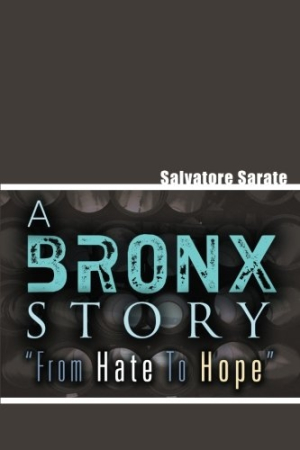A Bronx Story
From Hate to Hope
“Many people think that a tree that grows crooked will never grow straight,” writes Salvatore Sarate. In A Bronx Story, he has fictionalized his own life’s story to prove those people wrong. His tale is a sad one, but the personal strength he exhibits in seeking to triumph over adversity is, at times, inspiring.
Perhaps only the names of his family members and friends have been changed, because Sarate’s story comes across as a very personal tale. At fewer than fifty pages, it is not so much a novel as it is a chronological narrative of one man’s dangerously challenged existence and the efforts he makes to change course. With its combination of explanation and apology, A Bronx Story feels like a belated love letter to the people who have been most important in the main character’s life. Sincerely contrite, but also judgmental and difficult, the first-person narrator admits that, “I wasn’t the greatest person in the world… . I still have a way of annoying people and hopefully I will improve my attitude towards all the people I come in contact with in the near future.”
What works best in Sarate’s story is the narrator’s account of growing up as the son of Mexican and Italian immigrants in post-Depression New York City. The straightforward descriptions of poverty and violent abuse at the hands of his father are chilling, as is his tale of becoming a preteen criminal. Joining in with “the boys that wanted to make the fast money,” he starts off “with purse snatching, stealing from department stores and the usual house burglaries.”
Sarate succinctly but hauntingly describes his narrator’s disturbing time in a school for troubled teens, his anger upon release, and his association with a gang. At sixteen, his criminal activity culminates in a fatal stabbing that results in a ten- to twenty-year sentence for first-degree manslaughter; he serves seven years. Sarate’s descriptions of prison life are uncomfortably realistic, as vulgar as they are precise. His prose is rough, as is the story he tells.
The next forty or so years of the narrator’s life are covered quickly. Marriage, adoptions, job success, salvation, loss, tragedy, and illness are described. The narrative is uneven. At times, the intimate details are so awkwardly entwined with regret and apology that merely reading about them is distressing. When the story veers off course, however, all poignancy is lost. It is as if the author himself is not quite sure what he wants his book to be.
Sarate writes from the heart, but his tale is neither well written nor consistent. Grammatical, punctuation, and syntax errors abound. Touted as fiction, the book contains a very personal dedication from the narrator to other characters who helped him “heal the hate and anger … bottled up in me.” How much of the story is Sarate and how much is his fictional narrator is never clear, but it is tempting to make assumptions.
Reviewed by
Cheryl M. Hibbard
Disclosure: This article is not an endorsement, but a review. The publisher of this book provided free copies of the book and paid a small fee to have their book reviewed by a professional reviewer. Foreword Reviews and Clarion Reviews make no guarantee that the publisher will receive a positive review. Foreword Magazine, Inc. is disclosing this in accordance with the Federal Trade Commission’s 16 CFR, Part 255.

